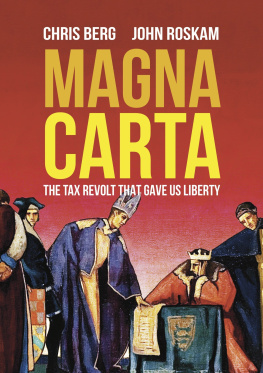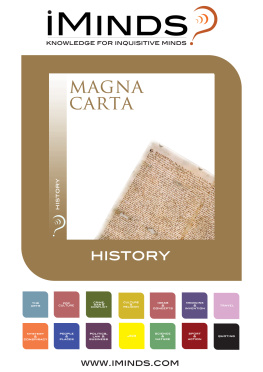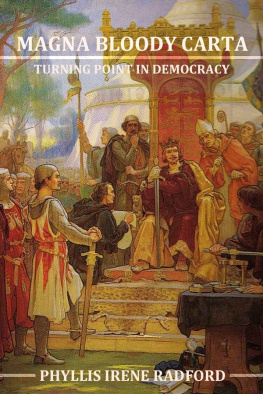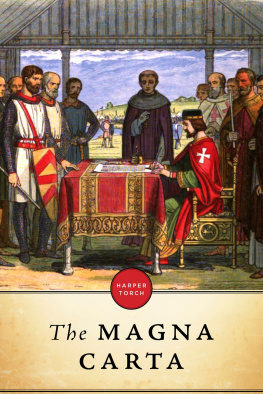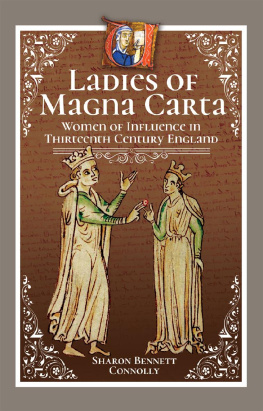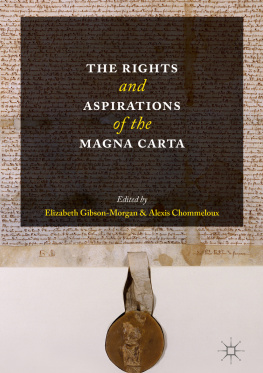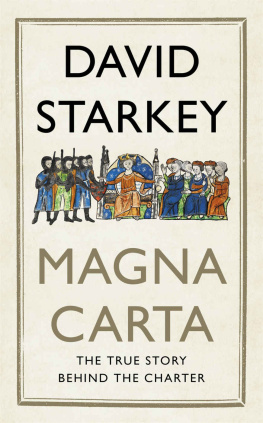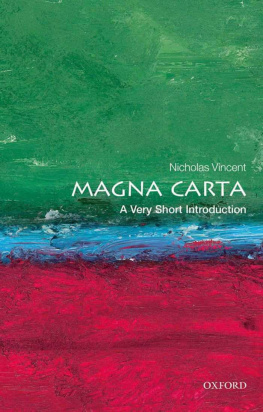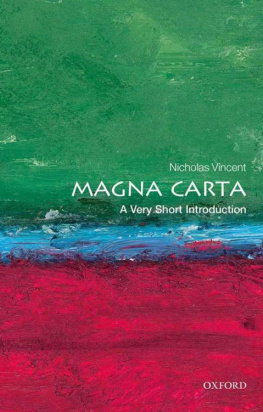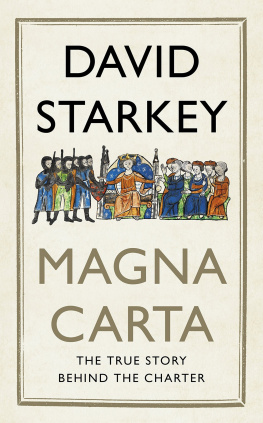The Magna Carta
Here you can read online The Magna Carta full text of the book (entire story) in english for free. Download pdf and epub, get meaning, cover and reviews about this ebook. year: 2006, genre: Romance novel. Description of the work, (preface) as well as reviews are available. Best literature library LitArk.com created for fans of good reading and offers a wide selection of genres:
Romance novel
Science fiction
Adventure
Detective
Science
History
Home and family
Prose
Art
Politics
Computer
Non-fiction
Religion
Business
Children
Humor
Choose a favorite category and find really read worthwhile books. Enjoy immersion in the world of imagination, feel the emotions of the characters or learn something new for yourself, make an fascinating discovery.
- Book:The Magna Carta
- Author:
- Genre:
- Year:2006
- Rating:5 / 5
- Favourites:Add to favourites
- Your mark:
- 100
- 1
- 2
- 3
- 4
- 5
The Magna Carta: summary, description and annotation
We offer to read an annotation, description, summary or preface (depends on what the author of the book "The Magna Carta" wrote himself). If you haven't found the necessary information about the book — write in the comments, we will try to find it.
Unknown: author's other books
Who wrote The Magna Carta? Find out the surname, the name of the author of the book and a list of all author's works by series.
The Magna Carta — read online for free the complete book (whole text) full work
Below is the text of the book, divided by pages. System saving the place of the last page read, allows you to conveniently read the book "The Magna Carta" online for free, without having to search again every time where you left off. Put a bookmark, and you can go to the page where you finished reading at any time.
Font size:
Interval:
Bookmark:
Project Gutenberg's The Magna Carta
Copyright laws are changing all over the world. Be sure to check thecopyright laws for your country before downloading or redistributingthis or any other Project Gutenberg eBook.
This header should be the first thing seen when viewing this ProjectGutenberg file. Please do not remove it. Do not change or edit theheader without written permission.
Please read the "legal small print," and other information about theeBook and Project Gutenberg at the bottom of this file. Included isimportant information about your specific rights and restrictions inhow the file may be used. You can also find out about how to make adonation to Project Gutenberg, and how to get involved.
**Welcome To The World of Free Plain Vanilla Electronic Texts**
**eBooks Readable By Both Humans and By Computers, Since 1971**
*****These eBooks Were Prepared By Thousands of Volunteers!*****
Title: The Magna Carta
Release Date: March, 2006 [eBook #10000][Yes, we are more than one year ahead of schedule][This file was first posted on October 15, 2003][Date last updated: January 2, 2003]
Edition: 0.1 [1.0 should be posted by December 10, 2003][The date of the 10th Anniversay of eBook #100]
Language: English
*** START OF THE PROJECT GUTENBERG EBOOK THE MAGNA CARTA ***
A note from Michael Hart, preparer of the 0.1 version.
This file contains a number of versions of the Magna Carta,some of which were a little mangled in transit. I am sureour volunteers will find and correct errors I didn't catch,and that version 0.2 - 1.0 will have significant improvments,as well as at least one more version in Latin.
Version 1.0 may contain a dozen different versions.
The Text of Magna Carta
JOHN, by the grace of God King of England, Lord of Ireland, Duke ofNormandy and Aquitaine, and Count of Anjou, to his archbishops,bishops, abbots, earls, barons, justices, foresters, sheriffs,stewards, servants, and to all his officials and loyal subjects,Greeting.
KNOW THAT BEFORE GOD, for the health of our soul and those of ourancestors and heirs, to the honour of God, the exaltation of the holyChurch, and the better ordering of our kingdom, at the advice of ourreverend fathers Stephen, archbishop of Canterbury, primate of allEngland, and cardinal of the holy Roman Church, Henry archbishop ofDublin, William bishop of London, Peter bishop of Winchester, Jocelinbishop of Bath and Glastonbury, Hugh bishop of Lincoln, Walter Bishopof Worcester, William bishop of Coventry, Benedict bishop ofRochester, Master Pandulf subdeacon and member of the papal household,Brother Aymeric master of the knighthood of the Temple in England,William Marshal earl of Pembroke, William earl of Salisbury, Williamearl of Warren, William earl of Arundel, Alan de Galloway constable ofScotland, Warin Fitz Gerald, Peter Fitz Herbert, Hubert de Burghseneschal of Poitou, Hugh de Neville, Matthew Fitz Herbert, ThomasBasset, Alan Basset, Philip Daubeny, Robert de Roppeley, John Marshal,John Fitz Hugh, and other loyal subjects:
(1) FIRST, THAT WE HAVE GRANTED TO GOD, and by this present charterhave confirmed for us and our heirs in perpetuity, that the EnglishChurch shall be free, and shall have its rights undiminished, and itsliberties unimpaired. That we wish this so to be observed, appearsfrom the fact that of our own free will, before the outbreak of thepresent dispute between us and our barons, we granted and confirmed bycharter the freedom of the Church's elections - a right reckoned to beof the greatest necessity and importance to it - and caused this to beconfirmed by Pope Innocent III. This freedom we shall observe ourselves,and desire to be observed in good faith by our heirs in perpetuity.
TO ALL FREE MEN OF OUR KINGDOM we have also granted, for us and ourheirs for ever, all the liberties written out below, to have and tokeep for them and their heirs, of us and our heirs:
(2) If any earl, baron, or other person that holds lands directly ofthe Crown, for military service, shall die, and at his death his heirshall be of full age and owe a `relief', the heir shall have hisinheritance on payment of the ancient scale of `relief'. That is tosay, the heir or heirs of an earl shall pay 100 for the entire earl'sbarony, the heir or heirs of a knight l00s. at most for the entireknight's `fee', and any man that owes less shall pay less, inaccordance with the ancient usage of `fees'
(3) But if the heir of such a person is under age and a ward, when hecomes of age he shall have his inheritance without `relief' or fine.
(4) The guardian of the land of an heir who is under age shall takefrom it only reasonable revenues, customary dues, and feudal services.He shall do this without destruction or damage to men or property. Ifwe have given the guardianship of the land to a sheriff, or to anyperson answerable to us for the revenues, and he commits destructionor damage, we will exact compensation from him, and the land shall beentrusted to two worthy and prudent men of the same `fee', who shallbe answerable to us for the revenues, or to the person to whom we haveassigned them. If we have given or sold to anyone the guardianship ofsuch land, and he causes destruction or damage, he shall lose theguardianship of it, and it shall be handed over to two worthy andprudent men of the same `fee', who shall be similarly answerable tous.
(5) For so long as a guardian has guardianship of such land, he shallmaintain the houses, parks, fish preserves, ponds, mills, andeverything else pertaining to it, from the revenues of the landitself. When the heir comes of age, he shall restore the whole land tohim, stocked with plough teams and such implements of husbandry as theseason demands and the revenues from the land can reasonably bear.
(6) Heirs may be given in marriage, but not to someone of lower socialstanding. Before a marriage takes place, it shall be' made known tothe heir's next-of-kin.
(7) At her husband's death, a widow may have her marriage portion andinheritance at once and without trouble. She shall pay nothing for herdower, marriage portion, or any inheritance that she and her husbandheld jointly on the day of his death. She may remain in her husband'shouse for forty days after his death, and within this period her dowershall be assigned to her.
(8) No widow shall be compelled to marry, so long as she wishes toremain without a husband. But she must give security that she will notmarry without royal consent, if she holds her lands of the Crown, orwithout the consent of whatever other lord she may hold them of.
(9) Neither we nor our officials will seize any land or rent inpayment of a debt, so long as the debtor has movable goods sufficientto discharge the debt. A debtor's sureties shall not be distrainedupon so long as the debtor himself can discharge his debt. If, forlack of means, the debtor is unable to discharge his debt, hissureties shall be answerable for it. If they so desire, they may havethe debtor's lands and rents until they have received satisfaction forthe debt that they paid for him, unless the debtor can show that hehas settled his obligations to them.
(10) If anyone who has borrowed a sum of money from Jews dies beforethe debt has been repaid, his heir shall pay no interest on the debtfor so long as he remains under age, irrespective of whom he holds hislands. If such a debt falls into the hands of the Crown, it will takenothing except the principal sum specified in the bond.
(11) If a man dies owing money to Jews, his wife may have her dowerand pay nothing towards the debt from it. If he leaves children thatare under age, their needs may also be provided for on a scaleappropriate to the size of his holding of lands. The debt is to bepaid out of the residue, reserving the service due to his feudal lords.Debts owed to persons other than Jews are to be dealt with similarly.
Next pageFont size:
Interval:
Bookmark:
Similar books «The Magna Carta»
Look at similar books to The Magna Carta. We have selected literature similar in name and meaning in the hope of providing readers with more options to find new, interesting, not yet read works.
Discussion, reviews of the book The Magna Carta and just readers' own opinions. Leave your comments, write what you think about the work, its meaning or the main characters. Specify what exactly you liked and what you didn't like, and why you think so.


